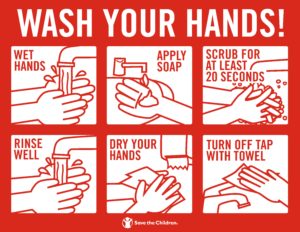Coronavirus—the biggest global health crisis of our lifetime—threatens children in every way. Save the Children is helping families and health workers get through this pandemic by delivering critical supplies, information and care to respond to the needs of the most vulnerable here at home and around the world:
- In Canada, we are working with our partners to address the most urgent needs of Indigenous children, their families and communities, in some of the hardest-reach-places across the country. We’re training front line health workers and caregivers on how to safeguard children and respond to their unique needs in a crisis, providing mental health and psychosocial support for children experiencing stress and anxiety. We are also sending books and other supplies to children who do not have resources at home so they can continue their learning. In addition, we are working to deliver personal protective equipment to Indigenous communities to help reduce the spread of COVID-19.
- Globally, we are strengthening our programs to provide health and education support, and responding to the unique needs of girls and women, as well as refugee, migrant and displaced communities. When coronavirus cases spike in places like Yemen, which has a high population of displaced children, Save the Children is on the ground making sure they have enough food to eat, can access healthcare, can continue their education, and are protected from violence.
- Save the Children aims to train 100,000 more health care workers over the next six months in response to this health crisis. Prior to the pandemic, our teams were already working with half a million community health workers across 44 countries – delivering vital health services that protect children from killer diseases – like pneumonia, malaria, sepsis and measles. We are also supplying protective equipment and other supplies front-line health workers desperately need. In addition, we are protecting children and families who may be separated due to quarantine, and providing tools and tips to keep children healthy and engaged during times out of the classroom.
- We’re in close contact with the World Health Organization, UN Agencies, and other international organizations to coordinate our response so that we’re as effective as possible.
- Wherever we work – in schools, refugee camps, or health clinics – we are doing our best to ensure the safety of children, their families, and the staff who work with them, putting in place measures to prevent infection and responding to the changing nature of the outbreak. While additionally providing cash support to low-income households, and providing families with information on how to protect themselves from the virus.
- We have developed an agenda for action to protect a generation as COVID-19 continues to spread. We’re calling for global solidarity to deliver on the following key areas: disease containment and mitigation, global financing, support for family finances, education and learning, and children’s safety and protection.
Check out our guidance, resources and tools on COVID-19 and how to keep the children in your life safe and learning during the pandemic.
Impact on Children:
While current trends indicate that children appear to be less severely affected by COVID-19, further data is urgently required to understand the nature of transmission and specific risks to children.

We know from our experience fighting Ebola and other infectious diseases that children can be at great risk in a health crisis. It is essential to put into place the plans that will ensure children’s health, safety and psychological well-being are at the forefront of government and community responses.
COVID-19 is threatening children’s rights, disrupting their education, healthcare, protection and well-being, including social interaction with family members, teachers and adult caregivers.
Children, especially younger ones, are dependent upon their caregivers for meeting their basic needs like food and shelter. If an adult caregiver in a child’s life falls ill, the child’s basic needs could be impacted.
During infectious disease outbreaks, caregivers may be unable to provide attentive care to their children due to illness, psychological distress, or other reasons. Reduced parental supervision can leave children more vulnerable to violence, exploitation and abuse.
Infectious disease outbreaks can have a devastating effect on families by limiting sources of income of family members due to illness, due to the need to care for sick family members, or by increasing household health-related expenses.
The education of millions of children is being impacted due to school closures. Children can perceive time differently to adults, and a few weeks or months out of school may seem like a much longer period of time to them. This means children tend to feel particularly anxious about any period of time they are out of school and the learning and socialization they are missing. They may fear they will not be able to catch up and start to worry that the longer schools are closed, the more likely they are to forget what the previously learned.
We know that children will continue to be affected by the coronavirus outbreak and we are here to support the most vulnerable children in crisis. We were established 100 years ago to defend child rights, combat injustice and extend opportunity – and that is what we will continue to do.
How to Help
Your support can help keep children safe and healthy in areas affected by COVID-19. Please donate to our Coronavirus Appeal today.




